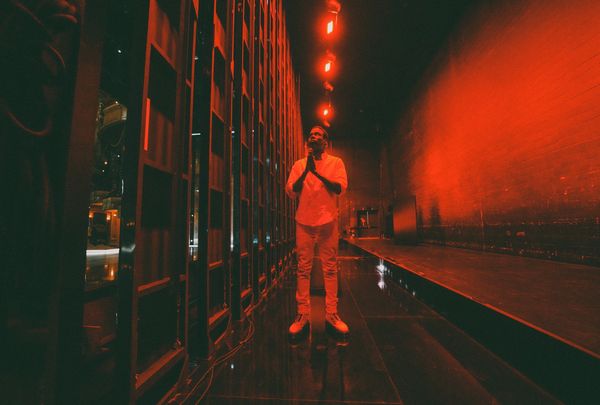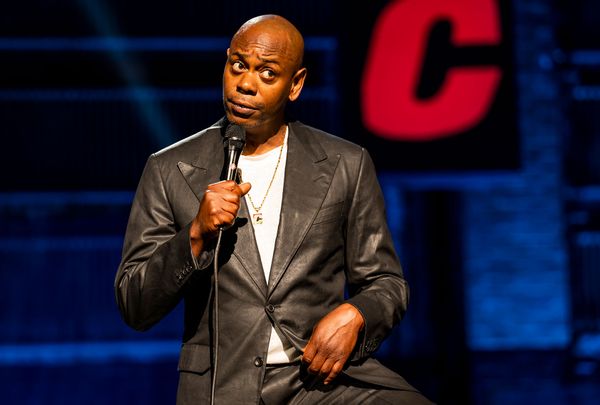Chris Rock’s “Selective Outrage” best exemplifies that comedy isn’t black or white – it’s green
While processing Chris Rock’s “Selective Outrage,” do not overlook what’s really being sold here: the continuation of a fight between two very rich men.
One of them, Will Smith, has spent the last year apologizing to his fans and polishing his image both on social media and on television. The other, Rock, is profiting off extending the feud by way of this special, the second in his $40 million obligation to Netflix that he scored in 2016. Placing beef on a menu guarantees people will show up, knives out.
Right-wing pundits are seizing upon Rock’s jokes … as evidence that he’s one of them now, or some grand sign that a cultural reckoning is coming.
Netflix counted on that, using the debut to test out the viability of live event streaming on its platform. Without knowing any viewership numbers related to the live stream, the special has at the very least become a talking point. Regardless, it still boils down to two rich guys quarreling and profiting off the public’s interest in it a year after the incident that incited it.
That makes everything related to this special and all else generated by Rock’s conflict with Smith collateral, including the perceived damage and assumptions concerning the comedian’s political views.
Accepting this makes the discourse in all its variants predictable. Of course, right-wing pundits are seizing upon Rock’s jokes about abortion, corporate virtue signaling and Meghan Markle, all proceeded by his invocation of their beloved term “wokeness,” as evidence that he’s one of them now, or some grand sign that a cultural reckoning is coming.
 “Chris Rock: Selective Outrage” backstage (Netflix)
“Chris Rock: Selective Outrage” backstage (Netflix)
Others view the set as Rock entertaining white audiences at the expense of the Black community. Honestly, that’s been the case since 1996, when “Bring the Pain” broke Rock out of his post-“Saturday Night Live” stall-out. His bit about a so-called Civil War between Black people and “n****s” got huge laughs from Black audiences and coverage across the media spectrum, from puff pieces in magazines to serious consideration on NPR’s “Fresh Air.” White people’s shock at Rock’s airing of conversations long held in spaces they hadn’t acknowledged made him both a generation’s honest broker and middle America’s view into Black America.
Its success established him as a peer to Eddie Murphy and Bill Cosby and the talent for Black comics to look to for guidance and influence. And he’s been spinning off versions of that set’s style and content pretty much ever since. This is not to imply that takes pointing out the misogynoir in Rock’s latest shot are wrong, but rather to remind folks that he’s been this way for a long time.
Indeed, the only thing that’s fundamentally changed about that version of Chris Rock and the one who delivered the mid-level humor of “Selective Outrage” is that yesterday’s version cared about entertaining the folks who were shelling out $25 bucks (which, in 1996, was a lot!) to see him.
He has been a rich guy with rich guy problems for a long time, though.
“Selective Outrage” has already lined his pockets, handing Rock the total prerogative to make his material utterly personal. Every comic does that, of course. But only one of them was socked in the face by an Oscar-winning megastar.
The event surrounding the set trumpeted Rock’s status as comedic royalty, placing him beyond the cares of average people and therefore separate from the material that once made him an effective, incisive comic.
He has been a rich guy with rich guy problems for a long time, though, which means he sees the world not in Black and white terms but in green. He has that in common with Dave Chappelle and Ricky Gervais, men of a status that relieves them of the burden of finding other subjects to mine for laughs besides the ones being hacked to death in the culture wars.
 Dave Chappelle: The Closer (Netflix)
Dave Chappelle: The Closer (Netflix)
Comedy’s console has a broad array of switches but pounding on red is a reliable way of yielding green. For Chappelle, indulging transphobia in his jokes generates headlines and outrage, which sells live show tickets. Rock’s angle in “Selective Outrage” is to go after hypocrites with the full force of his words. In the Smiths, he has an obvious target with which few can disagree – a hip-hop artist turned world-renowned movie star who, along with his wife Jada Pinkett Smith, has alloyed a portion of their brand to the notion of transparency.
Pinkett Smith did nothing to merit any involvement in this, by the way, regardless of what Rock says. She was pulled in by both Rock making an uninspired crack about her baldness and her husband’s explanation during his acceptance speech that what he did was in her defense and, by extension, in defense of Black women.
Following last year’s Oscars, the Smiths were strategic in their responses. Smith’s publicist fine-tuned a release in the direct aftermath of the debacle. In July he posted a video on YouTube, expressing his remorse. At the end of 2022 to promote his movie “Emancipation” he sat down with Trevor Noah for one of “The Daily Show” host’s final appearances, trusting in Noah’s empathy to confirm his contrition is genuine.
Meanwhile, Rock remained silent. In his first live show, which took place in Boston days after the telecast, he would only say that he was still processing what happened. “At some point I’ll talk about that s***, he told his audience, “And it’ll be serious and it’ll be funny, but right now I’m going to tell some jokes.”
Want a daily wrap-up of all the news and commentary Salon has to offer? Subscribe to our morning newsletter, Crash Course.
“Selective Outrage” has primarily been boiled down to its 10-minute closer when Rock lays into Smith and calls Pinkett Smith a “b***h” and a “predator” without ever using her name.
But it was plain to see that the 60 minutes that proceeded that tirade was informed by Rock’s enmity in the way that he used simplistic, well-trodden paths to connect his personal anger to cultural topics of conversation. They simply happened to be rich guy topics, which is the problem. The Lululemon bit exemplifies this.
Never mind that if he were to dig into the company’s history even slightly, he’d find plenty of established corporate bigotry on the part of its founder that would prove his point. The fact that he’s bringing up the company’s $100 yoga pants in the first place is, at best, odd for a guy like Rock.
Boutique athleisure wear is not exactly a wellspring of “I can’t believe he went there” material, save for people with money, privilege, and distance from everyday problems, or a comic who doesn’t want to go too far in one direction or another when it comes to taking a stance on social justice.
This is why an extended foray into his personal life, telling a story about how easy his daughters have it compared to his upbringing, fell flat. This segment was to humanize him as a regular father with kids who don’t know how good they have it. Except for the fact that jokes like the one with his daughter replying to her grade school teacher’s announcement that they would be learning about the four seasons with, “That’s my favorite hotel!” have limited relatability.
 “Chris Rock: Selective Outrage” (Netflix)
“Chris Rock: Selective Outrage” (Netflix)
Because of this, there was no fine line for Rock to walk as he did in his early comedy when he professes that he was merely saying aloud and before the world views expressed in barbershop banter. “These views have been out there forever,” he told Terry Gross back in 1997. “It’s just that nobody’s said it.”
Cut to Saturday, when he managed to pull off a callback to his antique O.J. Simpson joke by connecting it to the Kardashians. On some level that was clever since Rock couched the joke in a way that condemned Kanye West by association without ever actually saying his name. Then again, the Kardashians and O.J. are frequent flyer punchlines so common that they barely rate in late-night monologues.
Somehow it’s supposed to make a difference that Rock is the one making the joke, which is implied by his mic-dropping exit where he claims to be better than Smith by not fighting in front of white people on Oscars night. What is “Selective Outrage” if not expressly that?
Rock bragged that he had not and would never sit down with Oprah Winfrey or Gayle King to talk about that night as a matter of refusing to be a victim.
But that’s probably not the main reason he stayed mum. He knew that when one’s opponent tests the limits of Too Much Information, the most valuable commodity one can have is holding their silence until one can maximize the profitability of breaking it.
This is not fertile ground to foment original, provocative work. Essentially it guarantees that an artist like Rock, who in the past has delivered searing insights when it comes to race and class in America, will instead cook up a broadly agreeable product that displeases a few people and thrills those who equate fame with greatness.
Netflix sold the show as if it were steak when, at best, we were only ever going to get a McDonald’s hamburger. Now, is that an acceptable, solid substitution for the best version of his work? To some, sure. Many people even prefer fast food. Others may never be able to silence the voice in our heads reminding us that the kitchen is capable of better.
Read more
about this topic

